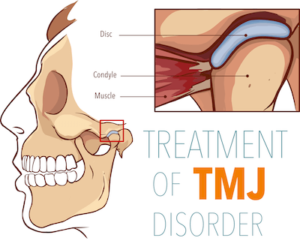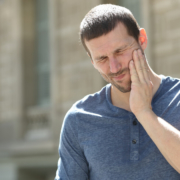Are You Suffering from TMJ Disorder?
Are you experiencing jaw pain, headaches, or a clicking or popping sensation when you chew? You may be suffering from TMJ Disorder. This article outlines what TMJ disorder is, what causes it, common symptoms, and TMJ disorder treatments available in Victoria, BC.
What Is TMJ Disorder and What Causes It?
TMJ Disorder (otherwise known as temporomandibular joint disorder) describes one or more conditions affecting the joints and surrounding tissues of the lower jaw. Your temporomandibular joints (located on each side of your jaw, in front of your ears) connects your lower jaw (mandible) with your upper jaw (maxilla) by a hinge-like joint and supporting muscles and ligaments that facilitate the opening and closing and sideways motion of your jaw.
Temporomandibular disorders can occur as a result of prolonged tension (such as teeth clenching and grinding), a genetic predisposition, underlying conditions affecting the connective tissue and joints (including arthritis), and general wear and tear, incorrect bite alignment or direct trauma. In some cases, the cause of a person’s TMJ disorder remains unknown but is almost always treatable.
Common Signs & Symptoms of TMJ Disorder
People experiencing TMJ disorder typically experience one or more of the following symptoms.
- Persistent or recurring pain or tenderness on one or both sides of the jaw
- Pain or discomfort when opening and closing mouth or chewing
- Aching pain in or around the ears
- Tinnitus (ringing in the ears)
- Difficulty fully opening and closing the mouth or chewing
- Pain, fatigue, or muscle spasms in the face, neck, and sometimes shoulders
- Clicking, popping, or grating sensation when opening and closing mouth or chewing (often accompanied by pain, discomfort, tension, or limited movement).
- Swelling on one or both sides of cheeks or jaw
- Dizziness and fatigue
- Increased frequency of headaches
- Aching back teeth
- Changes in bite alignment
- Facial tension and tenderness
- Locking of your jaw that interferes with your ability to open or close your mouth
It’s worth noting that many people suffer TMJ disorder symptoms without realizing a temporomandibular condition is the cause. Headaches and tinnitus are two examples of symptoms that can fly under the proverbial radar for years before a TMJ disorder is diagnosed.
Have You Been Experiencing One or More of the Symptoms Outlined Above?
Suppose you suspect you may be suffering from a TMJ condition. In that case, it’s a good idea to inquire with a health practitioner like our physiotherapists at Diversified Health Clinic before your condition worsens. TMJ disorders are very common, and treatment is often successful!
Things You Can Do to Mitigate TMJ Issues
While some causes and contributing factors are hard to avoid entirely, there are things you can do to prevent undue wear, tear and strain on your temporomandibular joints.
- Practice good posture and avoid clenching or forward jutting of the lower jaw (which can occur when straining during periods of stress or strain during exercise)
- Avoid biting down on large pieces of hard foods (such as jawbreakers)
- Wear a night guard or retainer during sleep if you are prone to nocturnal teeth grinding
- Stress and tension management, including mindful relaxation techniques of the face and neck muscles and therapeutic massage
- Alternate between a cold compress and moist heat for up to 10 minutes at a time following activity or when your face and jaw muscles feel tense
- Address or rule out suboptimal bite alignment with your dental provider
- Have your TMJ concerns checked out by a professional health practitioner at the onset of symptoms
- Specialized TMJ treatments that incorporate physiotherapy with intramuscular stimulation (IMS), transcutaneous electrical nerve stimulation (TMS), ultrasound, therapeutic massage and/or Class VI K-Laser Therapy as needed

Jaw pain is no fun and can lead to more serious complications if left untreated. When in doubt, have a health practitioner, such as our physiotherapists at Diversified Health, assess and treat the source of your pain and alleviate the discomfort you’re experiencing. Click here to learn more about our clinic’s diversified approach to effectively treating TMJ disorder.
If You Suffer From the Symptoms of TMJ Disorder:
Give our team of practitioners a call at Diversified Health Clinic today at (250) 382-0018 or book an appointment online. We’re happy to help answer your questions, address the cause of your pain and discomfort and get you on the road to recovery.





